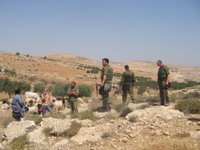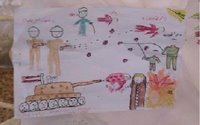Cycles of Violence
We are safe here in At-Tuwani. Thank you very much for your concern and especially your prayers, but do not worry about us- I am in the South Hebron Hills. I am not near the bombs or rockets. In fact, a few days ago one of the villagers suggested that his house could be used as a place of refuge for some who are fleeing their homes in the north.
We get very limited news while in Tuwani. We get random messages from our neighbors like “Israel bombed the Beirut airport,” “An apartment in Haifa was hit,” and “Israel is bombing the roads and bridges in Lebanon.” Yesterday, in Yatta, I began reading the news online. I read for 10 hours, until 5am. It sickens and saddens and angers me. I am worried for my friends, Palestinian and Israeli, not to mention the entire country of Lebanon.
We are already seeing the effects of this war in the West Bank. Israel has tightened its grip on Palestinians in the name of “security.” I worry about my Israeli friends who are reservists in the army. Military service is not optional here. When an Israeli turns 18, he or she is part of the military for 3 years (sometimes 2 for women). Those (men at least) who finish their service are automatically reservists.
Palestinians in the name of “security.” I worry about my Israeli friends who are reservists in the army. Military service is not optional here. When an Israeli turns 18, he or she is part of the military for 3 years (sometimes 2 for women). Those (men at least) who finish their service are automatically reservists.
We get very limited news while in Tuwani. We get random messages from our neighbors like “Israel bombed the Beirut airport,” “An apartment in Haifa was hit,” and “Israel is bombing the roads and bridges in Lebanon.” Yesterday, in Yatta, I began reading the news online. I read for 10 hours, until 5am. It sickens and saddens and angers me. I am worried for my friends, Palestinian and Israeli, not to mention the entire country of Lebanon.
We are already seeing the effects of this war in the West Bank. Israel has tightened its grip on
 Palestinians in the name of “security.” I worry about my Israeli friends who are reservists in the army. Military service is not optional here. When an Israeli turns 18, he or she is part of the military for 3 years (sometimes 2 for women). Those (men at least) who finish their service are automatically reservists.
Palestinians in the name of “security.” I worry about my Israeli friends who are reservists in the army. Military service is not optional here. When an Israeli turns 18, he or she is part of the military for 3 years (sometimes 2 for women). Those (men at least) who finish their service are automatically reservists. (picture= As they chase a Palestinian shepherd off the shepherd's land, young Israeli soldiers near At-Tuwani explain to CPT and Operation Dove, on tape, that they wish the Israeli settlers would leave because they think the settlers are crazy. They also explain to us that they have to be here if they do not want to go to prison.)
Many Israeli soldiers think what they are being forced to do is wrong. Soldiers near At-Tuwani tell us this often. It is not uncommon for Israeli soldiers to refer to the settlers as “crazy” or to tell us that they do not like what they are doing but they must do it to avoid prison. There are organizations in Israel for soldiers who are speaking out against the military and Israel’s actions in and against Palestine. “Breaking the Silence” is an organization specifically for soldiers in Hebron- it is one of the worst places to have to serve because the soldiers feel they “have” to do such horrible things to people and the settlers are incredibly violent, even against the military. Although the soldiers do have an option out of the military, it is not an easy choice. I have a lot of sympathy for the soldiers. A lot. The average soldier that we encounter is between 18-22 years old and has to be in the army or spend time in prison. All Israelis are required to serve in the military whether they agree with it or not (unless they have special circumstances) They must go to the army at age 18, postponing university and any other plans for their lives. A good Israeli friend of mine told me that the only way he stayed sane and kept from being brainwashed in the army was to begin meditating. He does not ever want to serve in the military again and yet, like most Israeli guys his age, he is a reservist. His 2 younger brothers are still in their mandatory 3 years of service. If he is called out, his parents will have all of their 3 children off at war, a war which no one in their family supports. To think of friends potentially going to war breaks my heart. It keeps me up at night and restless during the day. It is so so sad… much like the U.S., Israel is destroying its own society, as well as other societies, with enormous violence.
This cycle of violence that continues to spiral out of control reminds me of Judges 19-21. In Judges 19 a Levite and his unnamed concubine stay at a house in Gibeah while traveling on their way home. In the middle of the night, “wicked men” come to the house and demand to have sex with the Levite man (22). The owner of the home is too hospitable to allow the male Levite to be harmed by these wicked men. So, the owner of the home suggests that rather than harm the man, the wicked men take his “virgin daughter and his concubine…and… use them and do whatever [they] wish to them” (23-24). “So the man took his concubine and sent her outside to them, and they raped her and abused her throughout the night, and at dawn they let her go” (25). The Levite, who allowed this to happen to his concubine in the first place, is so angry at what the wicked men have done that he takes the dead body of his concubine home, chops her into 12 pieces and sends her throughout Israel demanding that everyone, “Consider, take counsel and speak out” (30).
The Israelites respond to this hideous crime by gathering “four hundred thousand soldiers armed with swords” (20:2). Together, all of the men decide to take revenge on Gibeah for the crime of these wicked men against the concubine (or, maybe they consider it a crime against the male Levite? A destruction of the Levite’s property, his concubine?) The men say they will “give [Gibeah in Benjamin] what they deserve for all this vileness done in Israel” (10). In the course of the battles, tens of thousands of Israelites and Benjamites die. After Israel finally defeats Benjamin, “Israel went back to the towns of Benjamin and put all the towns to the sword, including the animals and everything else that they found” (48). Over 65,000 “valiant fighters” (46) dies, but also all of the civilians of Benjamin are put to the sword for no apparent reasons? Only 600 Benjamite warriors escape.
The generous Israelite men decide that the 600 Benjamites who escaped need wives, but “the men of Israel had taken an oath at Mizpah: ‘Not one of us will give his daughter in marriage to a Benjamite” (21:1). The men decide that it is a good idea for the 600 Benjamites to have wives from Jabesh Gilead, since that tribe failed to gather at Mizpah when they made the oath. “So the assembly sent 12,000 fighting men with instructions to go to Jabesh Gilead and put to the sword those living there, including women and children” (21:10). They killed every “male and every woman who [was] not a virgin” (11). But, there was a problem- the 12,000 “fighting men” only found 400 women who “had never slept with a man” (12). The assembly sent the 400 women as an offer of peace to the 600 Benjamites, but “there were not enough for all of them” (14). However, the men of Israel come up with another plan- Knowing that the annual festival of the LORD at Shiloh is approaching, “they instructed the Benjamites, saying, ‘Go and hide in the vineyards and watch. When the girls of Shiloh come out to join in the dancing, then rush from the vineyards and each of you seize a wife from the girls of Shiloh and go to the land of Banjamin” (20-21).
“So that is what the Benjamites did” (23). They accept 400 virgins from Jabesh Gilead, after the other members of the virgins’ families were slaughtered, and they seized 200 young dancing girls from a festival in Shiloh. This was all a result of "wicked men" from Gibeah raping and torturing the unnamed concubine in Chapter 19. Men went to war, killing tens of thousands of soldiers, wiping out entire villages, and torturing more and more innocent people, namely women.
Like the suffering in Judges, the innocent still suffer today because of the actions of “wicked men” and poor decisions and actions by assemblies of the powerful with their own interests in mind. Lebanese, Israeli, Palestinian, Iraqi and U.S. civilians, mothers, fathers, brothers, sisters, young soldiers, orphans and widows all suffer because they are considered “collateral damage,” when wartime decisions are being made.. For the Israelites and Benjamites, for Israelis and Hizbollah, Palestinians and Israelis, the U.S. and Iraq, Sunnis and Shi’as, violence begets violence. It spirals out of control and does not bring peace.
 Streams of tears flow from my eyes
Streams of tears flow from my eyes because my people are destroyed.
My eyes will flow unceasingly,
My eyes will flow unceasingly,
without relief, until the LORD looks
down from heaven and sees.
What I see brings grief to my soul
Because of all the women of my city
. .(Lam 3:48-51).
(picture that a child in Iraq drew last summer. It is a picture of a US tank shooting a baby while a mother watches helplessly. Above the tank are two soldiers shooting another child. I am not sure what the other people in the picture are doing. This is the violence that this child witnesses.)
What I see brings grief to my soul
Because of all the women of my city
. .(Lam 3:48-51).
(picture that a child in Iraq drew last summer. It is a picture of a US tank shooting a baby while a mother watches helplessly. Above the tank are two soldiers shooting another child. I am not sure what the other people in the picture are doing. This is the violence that this child witnesses.)


0 Comments:
Post a Comment
<< Home